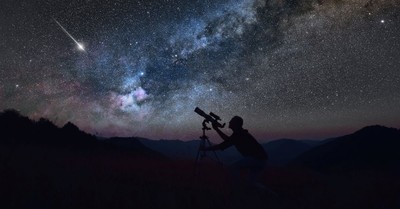The Gap between God and Science Is Closing
BreakPoint Daily Commentary


Audio By Carbonatix
By John Stonestreet and Timothy D Padgett, Crosswalk.com
In a recent article in The Spectator, a French engineer, investor, and author argued that “It’s getting harder for scientists not to believe in God.” According to Michel-Yves Bolloré,
More and more convincingly, and perhaps in spite of itself, science today is pointing to the fact that, to be explained, our universe needs a creator. In the words of Robert Wilson, Nobel Prize winner for the discovery of the echo of the Big Bang in 1978, and an agnostic: ‘If all this is true [the Big Bang theory] we cannot avoid the question of creation.’
For centuries, the inherent conflict between faith and reason and between science and religion has been widely assumed. For example, in their 2003 book, Rare Earth: Why Complex Life is Uncommon in the Universe, scientists Peter D. Ward and Donald Brownlee argued that, contrary to science fiction, there is little chance of complex life existing anywhere but Earth. However, just because our world is kind of special, they carefully pointed out (multiple times), does not imply it came from a Creator.
Bolloré thinks that this philosophical cold war is thawing, and not because scientists are abandoning facts and reason. Rather, facts are convincing them of the truth:
With sets of converging evidence from different scientific disciplines—cosmology to physics, biology to chemistry—it is increasingly difficult for materialists to hold their position. Indeed, if they deny a creator, then they must accept and uphold that the universe had no beginning, that some of the greatest laws of physics (the principle of conservation of mass-energy, for example) have been violated, and that the laws of nature have no particular reason to favour the emergence of life.
The long-running conflict between science and religion was entirely unnecessary. The Bible affirms the goodness of God’s creation in multiple passages. Genesis 1 describes the cosmos as a glorious Temple built for the fellowship of God and man. Psalm 19 argues that the beauty and order of creation points us to the Divine Artist behind it. Job 28 encourages human curiosity and exploration of the material world. By studying His world humans are led to worship God.
Even without getting into the intricacies of Scripture and theology, the stereotype that science is rooted in the neutral investigation of facts and religion rooted in imagination and feelings is historically idiosyncratic. That claim was more reflective of Scientism than actual science or scientists, as is the claim by Richard Dawkins in The God Delusion that freethinking scientists will lean toward atheism. The history of science is the history of hundreds of scientists—like Copernicus, Kepler, Newton, Faraday, Galileo, and others—who both believed in God and played foundational roles in establishing the scientific disciplines.
The change Bolloré has described in the Spectator article is primarily among the emerging generations of scientists, prompting the author to ask:
Could they be the ones showing older generations a new way forward, one in which religion and science can coexist? And, more to the point, we now have the scientific evidence that would support a big shift in perspective. In the words of 91-year-old Carlo Rubbia, Professor of Physics at Harvard and Nobel laureate: ‘We come to God by the path of reason, others follow the irrational path.’
Of course, the false dichotomy between science and religion is still deeply imbedded in many universities and scientific institutions. But that can be changed. Granting that a Designer exists can only make attempts to uncover and understand design in the world easier. Plus, it gives meaning to scientific work. What if a new generation of scientists see their work like Johannes Kepler did, as “thinking God’s thoughts after Him?”
In his 2000 book God and the Astronomers, Robert Jastrow predicted:
For the scientist who has lived by his faith in the power of reason, the story ends like a bad dream. He has scaled the mountains of ignorance, he is about to conquer the highest peak; as he pulls himself over the final rock, he is greeted by a band of theologians who have been sitting there for centuries.
Well, to put it mildly, theology has had its own issues. Still, we can all be hopeful that the war between science and religion is coming to an end. It should have never started in the first place.
Photo Credit: ©GettyImages/m-gucci
John Stonestreet is President of the Colson Center for Christian Worldview, and radio host of BreakPoint, a daily national radio program providing thought-provoking commentaries on current events and life issues from a biblical worldview. John holds degrees from Trinity Evangelical Divinity School (IL) and Bryan College (TN), and is the co-author of Making Sense of Your World: A Biblical Worldview.
The views expressed in this commentary do not necessarily reflect those of CrosswalkHeadlines.
BreakPoint is a program of the Colson Center for Christian Worldview. BreakPoint commentaries offer incisive content people can't find anywhere else; content that cuts through the fog of relativism and the news cycle with truth and compassion. Founded by Chuck Colson (1931 – 2012) in 1991 as a daily radio broadcast, BreakPoint provides a Christian perspective on today's news and trends. Today, you can get it in written and a variety of audio formats: on the web, the radio, or your favorite podcast app on the go.


























